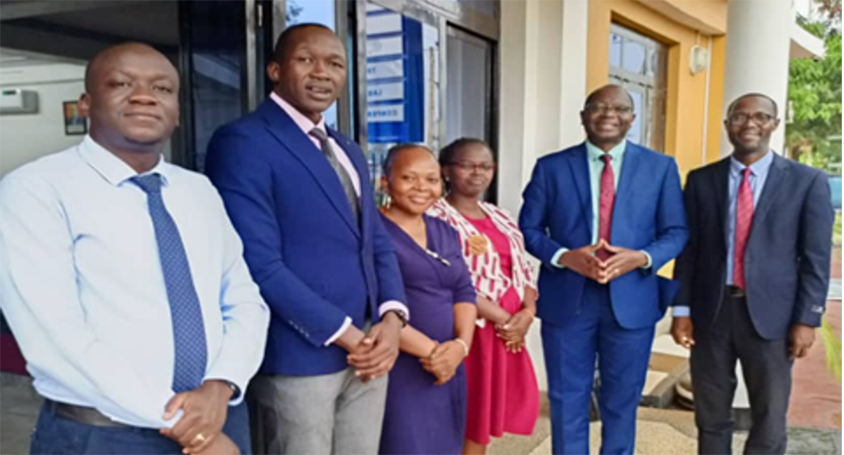IDEA Fellowship: global experts call for rebranding ebola virus disease to combat stigma and strengthen global preparedness

On 13 March 2025, the IDEA Fellowship Programme, led by Busitema University, Uganda, convened a pivotal global conference that united international experts, policymakers, researchers, and healthcare practitioners. The gathering aimed to enhance preparedness and response strategies for Ebola Virus Disease (EVD) under the theme “Strengthening Response and Preparedness in Ebola Outbreak.” A critical focus of this conference was the urgent need to rename the Ebola virus to mitigate the stigma surrounding it and to strengthen global response efforts. The IDEA Fellowship programme is part of the EDCTP and the Africa CDC initiative to support consortia, providing Master’s-level training in these critical fields.
The implications of disease nomenclature
Professor Peter Olupot-Olupot, from the Busitema University and the Mbale Clinical Research Institute (MCRI), led the discussions, highlighting how the nomenclature of diseases significantly influences public perception, healthcare interventions, and policy decisions. He referenced the World Health Organization’s (WHO) decision to rename Monkeypox to Mpox, a change that has effectively reduced societal stigma and improved public acceptance.
The Ebola virus was first identified in 1976 along the Ebola River in the Democratic Republic of Congo, and since then, there have been 42 recorded outbreaks across 18 countries, primarily in Africa. The devastating West African epidemic in 2014 remains the most extensive outbreak on record, resulting in over 28,610 confirmed cases and a fatality rate approaching 40%.
Professor Olupot-Olupot further elaborated on the implications of geographically linked disease names, citing historical examples such as Middle East Respiratory Syndrome (MERS) and Spanish influenza. These names have adversely affected international relations, local economies, and public health initiatives. He emphasised that the existing geographical designations of Ebola virus strains, such as Ebola Sudan, Ebola Bundibugyo, and Ebola Zaire, fail to accurately represent the significant genetic diversity and varying clinical presentations of different Ebola strains. This context underscores the need for a strategic approach to disease naming that takes into account its societal impacts.
To address these challenges, the conference panel proposed alternative scientific terminology that aligns with WHO naming standards. Suggested terms included:
- Filoviral Haemorrhagic Fever (FHF)
- Severe Viral Haemorrhagic Fever (SVHF)
- Clear subtype classifications to reflect virological and clinical distinctions.
This reclassification aims not only to minimise stigma but also to enhance precision and clarity within the global scientific and medical communities.
Enhancing surveillance and community cooperation
Dr Godfrey Bwire from Uganda’s Ministry of Health and Dr William Okiror, an IDEA Fellow, underscored the necessity of robust surveillance systems, real-time data tracking, improved diagnostics, and advanced early-warning frameworks. Dr Bwire highlighted that the current outbreak of Ebola in Uganda, declared on 30 January 2025, is unique due to its lower infectivity and mortality rates compared to previous outbreaks. He attributed these positive outcomes to effective government efforts and extensive experience in managing Ebola outbreaks in Uganda and sub-Saharan Africa.
Additionally, Dr Muhamed Mulongo from the Mbale Clinical Research Institute/Busitema University noted that the stigma associated with the current name of the disease complicates community cooperation with quarantine protocols, thereby reinforcing the need for a comprehensive renaming strategy.
Continued research and capacity building
Professor Pauline Byakika, Vice Chancellor of Mbarara University of Science and Technology, Uganda, advocated for ongoing clinical trials and scientific research aimed at developing effective Ebola vaccines and therapeutic interventions. She stressed that sustained international collaboration and investment in scientific capacity building are critical for the effective management of future outbreaks.
Capacity-building and policy strategies emerged as central themes during the conference. Professor Paul Waako, Vice Chancellor of Busitema University, highlighted the substantial contributions of the IDEA Fellowship Programme in training epidemiologists proficient in surveillance, outbreak investigation, and epidemic response. Dr Alex Ario from the Uganda Ministry of Health and Dr Thomas Nyirenda from the EDCTP Association reinforced the importance of sustained funding and strategic partnerships, citing successes from previous EDCTP programmes that have significantly improved research capacity and infrastructure.
Conclusion and call to action
Dr Andrew Ocero and Professor Sam Okware focused discussions on necessary policy reforms and effective stakeholder coordination. They advocated for strategic funding partnerships to overcome resource gaps and ensure preparedness and sustainable response mechanisms. Dr Charles Olaro, Director General of the Ministry of Health, reiterated the importance of robust national and international collaboration, stating, “Effective Ebola management requires strong partnership, sustained funding, and strategic preparedness plans.”
The conference acknowledged crucial funding support from EDCTP and the Government of Uganda, which facilitated both the gathering and ongoing research initiatives.
The meeting concluded with Professor Olupot-Olupot urging stakeholders to convert conference insights into actionable policies and interventions. He emphasised a phased, inclusive approach to renaming Ebola Virus Disease to foster broad community acceptance and enhance global health responses.
IDEA Fellowship Program Fellow, Sarah Racheal Akello, who led the local organising committee, was recognised for her exemplary role in facilitating this impactful international dialogue. Participants were encouraged to engage actively with the Global Viral Haemorrhagic Fever Research Network (GLOVIRN) to ensure continued collaboration, knowledge-sharing, and unified response strategies against future Ebola outbreaks.
Ultimately, the consensus is that rebranding Ebola represents more than a mere change of terminology; it signifies a strategic shift towards a scientifically precise, culturally sensitive, and globally unified approach to disease management, epidemic preparedness, and joint global response.
